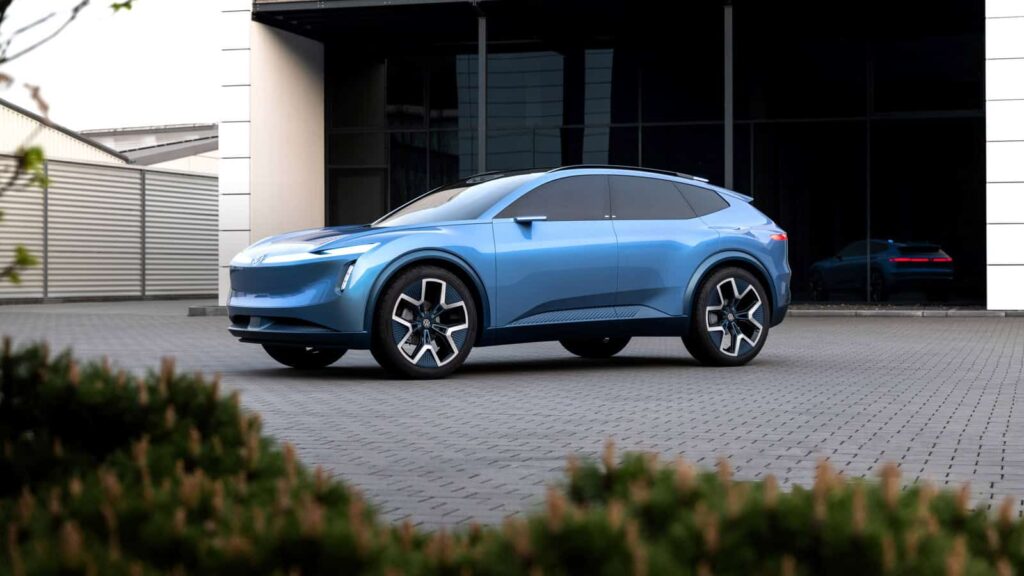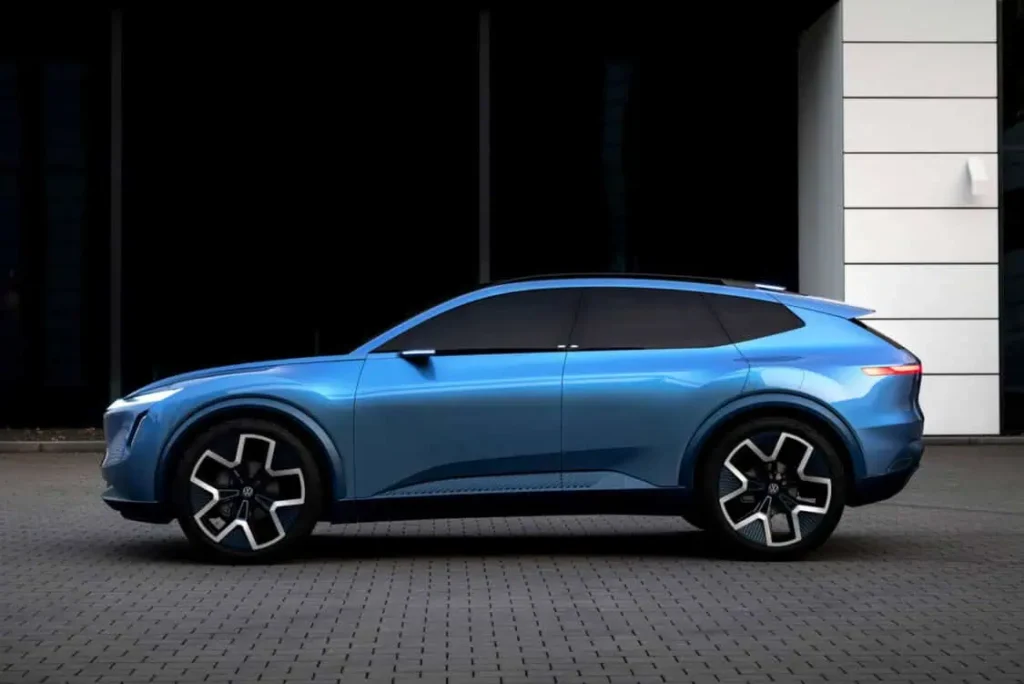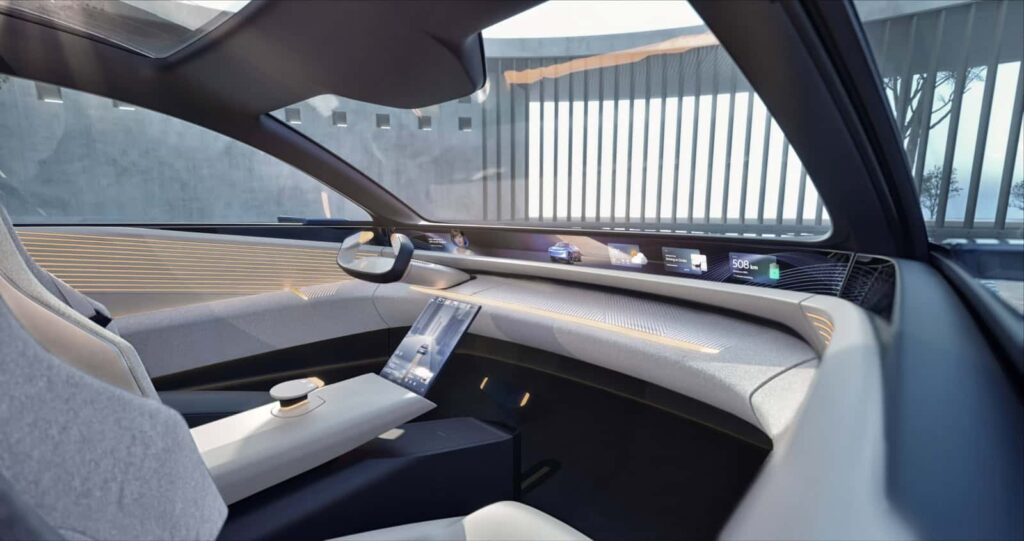VW Debuts Design Show ID. CODE EV at Auto China 2024
With the world premiere of the electric-powered ID. CODE at Auto China 2024, Volkswagen (VW) did not just unveil a new electric vehicle; it introduced a bold step forward in automotive design and technology. This concept car embodies the future vision of Volkswagen’s fleet, showcasing an innovative design language that blends aesthetic appeal with functional brilliance. Designed specifically with Chinese consumers in mind, the VW ID. CODE is a testament to Volkswagen’s commitment to understanding and innovating for regional markets.

The electric-powered VW ID. CODE features powerful, clear, and fluid surfaces that catch the eye and captivate the imagination. What sets the ID. CODE apart is its exterior, functioning as a projection surface for cutting-edge AI-assisted lighting and display systems, heralding a new era of interaction between the vehicle and its environment.
Inside, Volkswagen has reimagined the concept of cabin space, merging the real and virtual to craft a living space that offers an unparalleled mobility experience. This electric concept car pushes the boundaries with its dual driving modes, allowing for conventional driving or Level 4 autonomous operation, marking a significant milestone in the journey towards fully autonomous vehicles.
Broad Product Portfolio for China by 2030 Announced
The expansion of the ID. family (which includes the ID.4 and ID.Buzz) to a total of 16 models by 2030 marks a significant step in Volkswagen’s ambitious electrification strategy. Among these is the introduction of five EVs under the new ID.UX sub-brand by 2027, which underscores Volkswagen’s commitment to diversifying and enriching its EV offerings.
Volkswagen’s strategy not only includes introducing electric versions of popular ICE models, but also expanding its portfolio in China with the addition of new, highly-efficient plug-in hybrids (PHEVs) capable of exceeding 100 kilometers (62 miles) on electric power alone. The lineup will be further bolstered by six hybrids, set to debut by 2030.
In a move to adapt to and integrate within the Chinese market, Volkswagen is relying on its proven MQB and MEB vehicle architectures. The Volkswagen Group’s MQB platform is its strategy for shared modular design construction of its transverse, front-engine, front-wheel-drive layout automobiles. VW’s MEB architecture is aimed to “consolidate electronic controls and reduce the number of microprocessors, advance the application of new driver-assistance technology and somewhat alter the way cars are built,” said the company.

VW’s Chinese Partners
VW is also innovating through strategic local partnerships, such as the cooperation with Chinese company XPeng. This local collaboration is part of Volkswagen’s broader strategy to develop tailored solutions for the Chinese market
Significantly, the Hefei-based Volkswagen China Technology Company (VCTC) is spearheading the development of the Group’s first electric platform specifically crafted for China, known as the China Main Platform (CMP). Starting in 2026, this platform is expected to underpin at least four additional models targeted at the electric entry-level segment.
By leveraging multiple platforms, Volkswagen aims to provide optimized products across all relevant segments, catering to the diverse needs of its customers globally and particularly in China, a crucial market for Volkswagen’s growth and innovation in electric mobility.
New All-Electric ID.UX Sub-Brand Expands Product Range
With the ID. CODE as a new SUV for China, VW is set to redefine the electric vehicle landscape in China with the introduction of its new all-electric ID.UX sub-brand, specifically targeting new customer groups. The ID.UX marries Volkswagen’s renowned qualities of reliability, performance, and safety with a lifestyle-oriented design DNA aimed particularly at younger consumers.
This fusion is manifested in the brand’s specific features, which include a progressive exterior that captures the essence of modernity and innovation alongside a driver-centric interior. The interior design is revolutionary, featuring an entirely new display and operating concept (HMI) that prioritizes intuitiveness and technological advancement, catering to the preferences of young, tech-savvy customers.

The launch of the ID.UX sub-brand will be led by the debut of its first model, the ID.UNYX, scheduled for market introduction in 2024. The ID.UNYX is expected to exemplify the unique blend of Volkswagen’s proven virtues with a fresh, lifestyle-oriented approach to EV design. This strategic expansion of Volkswagen’s EV offering underscores the company’s commitment to innovation, sustainability, and meeting the diverse needs of the Chinese market, marking a significant step towards catering to evolving consumer preferences and cementing Volkswagen’s presence in the future of electric mobility.
Intensified Local Development In China for Greater Innovation
Volkswagen is markedly enhancing its ecosystem encompassing production, development, procurement, and battery production in China, signaling a robust strategy to solidify its foundation in the world’s largest automotive market. By the conclusion of this year, Volkswagen’s R&D site in Anhui will boast a diverse team of 3,000 experts.
In a strategic move to condense development cycles significantly, Volkswagen is intensifying its localization efforts. The introduction of Chinese stalwarts such as XPeng, Horizon Robotics, and Thundersoft into the development process at an early stage is a testament to this strategy. These collaborations aim to harness local expertise and cutting-edge technology that resonate with the market’s dynamics. Specifically, the partnership with electric vehicle manufacturer XPeng will lead to the launch of two new mid-class vehicles in 2026.
Volkswagen’s collaborations through its joint ventures — CARIZON with Horizon Robotics and CARThunder with Thundersoft — are pivotal to its strategy. Employees in these ventures are at the forefront of developing avant-garde systems related to autonomous driving, infotainment, and connectivity. With these collaborations and partnerships in China, Volkswagen is set to outpace American OEMs, who have a more difficult relationship with China.

Electric Vehicle Marketing Consultant, Writer and Editor. Publisher EVinfo.net.
Services